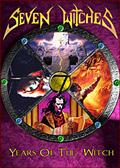KAMELOT (usa-no) - Poetry For The Poisoned (2010)

Label : EarMusic
Sortie du Scud : 20 Septembre 2010
Pays : Etats-Unis / Norvège
Genre : Power Metal mélodique
Type : Album
Playtime : 14 Titres - 50 Mins
Peut-on parler de KAMELOT aujourd'hui comme d'un groupe majeur ? Assurément. Enchainant les albums de grande classe (Epica, The Black Halo, Ghost Opera) et les prestations scéniques remarquées, le combo mené par Thomas Youngblood (guitares) fait figure d'incontournable et c'est tant mieux. Le nouveau KAMELOT, cru 2010, se nomme Poetry For The Poisoned, et s'inscrit dans la droite lignée de ses prédécesseurs, tout en illustrant la progression remarquable du quintet. A l'image de sa pochette, Poetry For The Poisoned se veut sombre, sophistiqué, peu accessible. Il vous faudra d'ailleurs plusieurs écoutes pour en apprécier la vraie saveur. Mais le jeu en vaut la chandelle. Il serait dommage de passer à côté de ça.
Fidèles aux postes, Sascha Paeth et Miro se chargent toujours de la production, tandis que parmi les invités, on compte des habitués comme Simone Simons (EPICA) et Amanda Somerville, et de nouvelles têtes nommées Björn "Speed" Strid (hurleur de SOILWORK), Jon Oliva (frontman de SAVATAGE) et Gus G (gratteux d'OZZY et FIREWIND). C'est surtout la présence de "Speed" qui constitue la vraie surprise sur cet album. Comment sa voix et celle de Roy Khan allaient-elles se marier ? Et bien, en un mot : parfaitement. Strid apporte à "The Great Pandemonium" sa dose d'ambiance malsaine, un peu comme ce qu'avait réalisé Shagrath de DIMMU BORGIR sur "March Of Mephisto" (The Black Halo). A la limite du Metal Indus, tout en conservant cette facette mélodique lorsque Khan intervient, "The Great Pandemonium" dévoile l'ambition dont sait faire preuve KAMELOT. Le risque est pris, assumé, et réussi. Les guitaristes seront heureux d'apprendre que Thomas Youngblood se lâche complètement sur un solo très inspiré et néo-classique.
D'ailleurs, le brun guitariste nous assène de rythmiques un brin torturées et peu conventionnelles, uniques en leur genre, dont il peut se revendiquer comme le dépositaire. Tout au long de l'album, ses parties de six-cordes se complètent avec la section rythmique composée de Casey Grillo (le meilleur batteur du circuit, rien à dire là dessus) et du nouveau venu Sean Tibbetts (basse). Forcément, sans avoir abandonné ce côté oriental qui lui va si bien, KAMELOT est du coup reconnaissable entre mille. Car il y a bien un style KAMELOT, et il devient difficile voire dommage de le définir, de le cloisonner dans un style bateau.
Un album de KAMELOT n'en serait pas un sans ces chants de sirènes enchanteurs. L'éternelle question, celle qui consiste à se demander ce que deviendrait KAMELOT sans ses invités, demeure, mais à quoi bon refuser la présence de telles déesses ... La magie opère dès que Simone et Amanda accompagnent Roy Khan, que ce soit sur "House On A Hill" mais surtout "So Long", le passage le plus fort de la pièce "Poetry For The Poisoned". Ce titre éponyme rassemble 10 petites minutes d'intensité métallique, couvrant toutes les émotions possibles. Et comme KAMELOT, c'est aussi du Power Metal bien balancé, car il faut bien appeler ça ainsi, finalement, on note des titres plus directs comme le single "Hunter's Season" (qui rappelle le KAMELOT qui sonnait à la STRATOVARIUS) ou ce "Necropolis", à la fois Heavy et épique. Seul le duo avec Jon Oliva, "The Zodiac", semble sans intérêt, mais encore une fois, comme dit plus haut, Poetry For The Poisoned n'a rien, mais alors rien d'accessible. Même les notes les plus simples ont été minutieusement pensées, chaque arrangement résulte d'un travail de composition poussé.
Sans atteindre la perfection d'un Black Halo, Poetry For The Poisoned dévoile 50 minutes de Metal classieux, puissant, progressif. On dit parfois qu'un album qui se découvre peu à peu sera toujours apprécié dans 20 ans. Nul doute qu'on en parlera dans quelques temps comme d'un album clé de la carrière de KAMELOT. Enfin non, comme d'un album clé tout court.
Ajouté : Mercredi 13 Octobre 2010
Chroniqueur : NicoTheSpur
Score :    
Lien en relation: Kamelot Website
Hits: 14215
|














